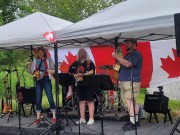
TORONTO — Ontario won’t settle for a “bad deal” when it comes to billions in required financial aid for municipalities, Premier Doug Ford said Wednesday, as the rift between the province and federal government over desperately needed civic funding appeared to widen.
Ford said he is involved in active talks with Ottawa to secure funding for municipalities strapped for cash due to the COVID-19 pandemic.
Municipal leaders said earlier this week that an aid package from both upper levels of government is needed to prevent tax increases and service cuts.
The premier said he is not willing to settle for the current federal offer because it is more than a billion dollars short of what’s needed to help shore up Ontario communities.
“If I walked away, the municipalities wouldn’t be too happy with the amount that the federal government’s offering right now,” Ford said.
The premier said Ontario represents 38 per cent of Canada’s population, and he believes it should receive the equivalent to that in the federal deal.
“I don’t rush a bad deal,” he said.
Some municipalities have expressed frustration in recent months that they are stuck in the middle of a lingering stand-off between the federal and Ontario governments over the aid package.
The municipal leaders have said $10 billion is needed for communities across the country, including Ontario, and federal and provincial governments must resolve their differences before cuts and fee hikes are needed.
A spokeswoman for Deputy Prime Minister Chrystia Freeland said the federal government recognizes municipalities face serious financial pressures.
“We have offered $14 billion to support Canadians and we hope we can soon conclude an agreement with all the premiers that will ensure this funding is delivered to those who need it,” Katherine Cuplinskas said in a statement.
Meanwhile, Ford’s government introduced a sweeping new piece of legislation Wednesday it said will help the province’s economy recover from the pandemic.
The omnibus bill — dubbed the COVID-19 Recovery Act — proposes to change 20 pieces of current legislation that govern the province’s schools, municipalities, and justice system.
Municipal Affairs Minister Steve Clark said if passed, the bill would speed up environmental assessments, offer new consumer protections and help address unemployment.
Ford defended the bill and said it will help change an environmental assessment process that has been on the books for decades.
“We aren’t going to dodge (environmental assessments) or anything,” he said. “We’re going to make sure we strengthen them, but we’re going to do them quicker, smarter.”
Clark said the bill would also create an economic agency — Invest Ontario — to help attract more international investment to the province.
The 188 page bill also includes measures announced by Education Minister Stephen Lecce this week to end school suspensions for students in junior kindergarten to Grade 3.
Clark said with limited days of sitting at the provincial legislature, it made sense to combined the different changes into one package.
NDP Leader Andrea Horwath said the bill isn’t actually a pandemic recovery plan at all, and is short on rent relief, solutions for long-term care, and details on schools required to truly help Ontarians.
“I’m worried that Doug Ford is using the COVID-19 recovery as cover to plow ahead with changes that have nothing at all to do with recovering from this pandemic,” she said.
Green party Leader Mike Schreiner said changing environmental regulations is not necessary to get the economy moving.
“Caring for nature, farmland and water is a vital part of the economic recovery, not something we sacrifice,” he said in a statement.
The government also tabled a motion on Wednesday to extend the province’s state of emergency until July 24.
The current state of emergency declared at the start of the COVID-19 pandemic is set to expire July 15.
Ford’s office said the government wants to extend the measure to ensure there is no gap between that declaration ending and a new bill extending Ontario’s emergency measures taking effect.
Solicitor General Sylvia Jones introduced that bill on Tuesday, saying the province will need to keep some emergency measures in place in the months ahead.
Ontario reported 118 new cases of COVID-19 on Wednesday, and nine new deaths due to the novel coronavirus.
The total number of cases now stands at 36,178, which includes 31,805 marked as resolved and 2,700 deaths.
The province also reported 202 newly resolved cases, and completed more than 22,832 tests for the novel coronavirus over the previous 24 hours.
The number of people in hospital because of the virus, in intensive care units and on ventilators all slightly decreased.
Health Minister Christine Elliott said 30 of the province’s 34 public health units reported five or fewer new cases, with 18 reporting none.
This report by The Canadian Press was first published July 8, 2020.
Shawn Jeffords, The Canadian Press
- June 24, 2025 Issue - June 26, 2025
- June 10, 2025 Issue - June 15, 2025
- May 24, 2025 Issue - May 25, 2025










































